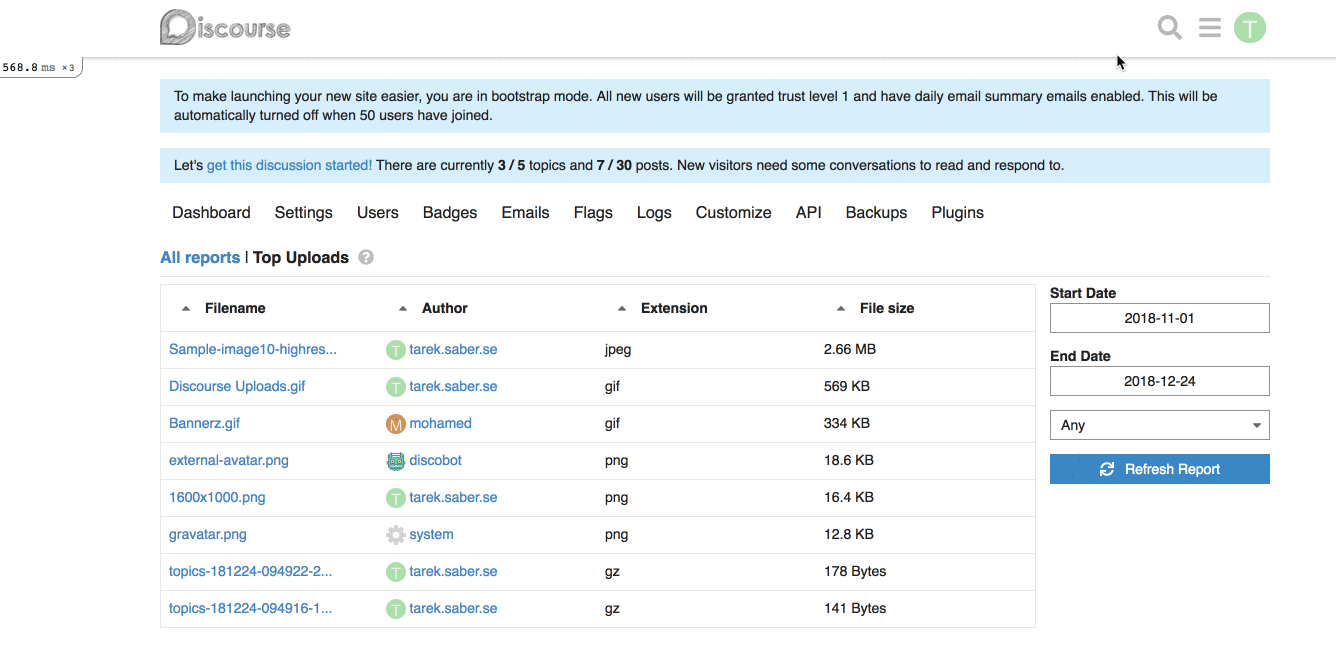Providing invalid dates as the end_date or start_date param causes a 500 error and creates noise in the logs. This will handle the error and returns a proper 400 response to the client with a message that explains what the problem is.
Zeitwerk simplifies working with dependencies in dev and makes it easier reloading class chains.
We no longer need to use Rails "require_dependency" anywhere and instead can just use standard
Ruby patterns to require files.
This is a far reaching change and we expect some followups here.
This reduces chances of errors where consumers of strings mutate inputs
and reduces memory usage of the app.
Test suite passes now, but there may be some stuff left, so we will run
a few sites on a branch prior to merging
* FEATURE: Exposing a way to add a generic report filter
## Why do we need this change?
Part of the work discussed [here](https://meta.discourse.org/t/gain-understanding-of-file-uploads-usage/104994), and implemented a first spike [here](https://github.com/discourse/discourse/pull/6809), I am trying to expose a single generic filter selector per report.
## How does this work?
We basically expose a simple, single generic filter that is computed and displayed based on backend values passed into the report.
This would be a simple contract between the frontend and the backend.
**Backend changes:** we simply need to return a list of dropdown / select options, and enable the report's newly introduced `custom_filtering` property.
For example, for our [Top Uploads](https://github.com/discourse/discourse/pull/6809/files#diff-3f97cbb8726f3310e0b0c386dbe89e22R1423) report, it can look like this on the backend:
```ruby
report.custom_filtering = true
report.custom_filter_options = [{ id: "any", name: "Any" }, { id: "jpg", name: "JPEG" } ]
```
In our javascript report HTTP call, it will look like:
```js
{
"custom_filtering": true,
"custom_filter_options": [
{
"id": "any",
"name": "Any"
},
{
"id": "jpg",
"name": "JPG"
}
]
}
```
**Frontend changes:** We introduced a generic `filter` param and a `combo-box` which hooks up into the existing framework for fetching a report.
This works alright, with the limitation of being a single custom filter per report. If we wanted to add, for an instance a `filesize filter`, this will not work for us. _I went through with this approach because it is hard to predict and build abstractions for requirements or problems we don't have yet, or might not have._
## How does it look like?

## More on the bigger picture
The major concern here I have is the solution I introduced might serve the `think small` version of the reporting work, but I don't think it serves the `think big`, I will try to shed some light into why.
Within the current design, It is hard to maintain QueryParams for dynamically generated params (based on the idea of introducing more than one custom filter per report).
To allow ourselves to have more than one generic filter, we will need to:
a. Use the Route's model to retrieve the report's payload (we are now dependent on changes of the QueryParams via computed properties)
b. After retrieving the payload, we can use the `setupController` to define our dynamic QueryParams based on the custom filters definitions we received from the backend
c. Load a custom filter specific Ember component based on the definitions we received from the backend
- remove inactive user report and replace with posts
- clean up internals so grouping by week happens on client
- when switching periods old report was not destroyed leading to bugs
- calculate trend based on previous interval ... not previous 30 days
- show percentages for mau/dau
- be more careful about utc date usage
- show uniqu and click through rate on search panel
- publish key of report with report so we only load the correct one
- subscribe earlier in channel in case of concurrency issues
* `1.month.ago + 1.month` uses the calendar month for calculations
such that `1.month.ago` from the 30th of March 2017 will give
us the 28th of February 2017. Adding one month ahead from
28th February 2017 will be 28th of March 2017.